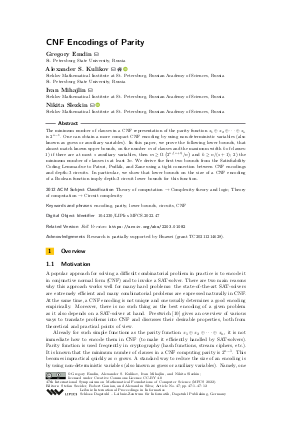@InProceedings{emdin_et_al:LIPIcs.MFCS.2022.47,
author = {Emdin, Gregory and Kulikov, Alexander S. and Mihajlin, Ivan and Slezkin, Nikita},
title = {{CNF Encodings of Parity}},
booktitle = {47th International Symposium on Mathematical Foundations of Computer Science (MFCS 2022)},
pages = {47:1--47:12},
series = {Leibniz International Proceedings in Informatics (LIPIcs)},
ISBN = {978-3-95977-256-3},
ISSN = {1868-8969},
year = {2022},
volume = {241},
editor = {Szeider, Stefan and Ganian, Robert and Silva, Alexandra},
publisher = {Schloss Dagstuhl -- Leibniz-Zentrum f{\"u}r Informatik},
address = {Dagstuhl, Germany},
URL = {https://drops.dagstuhl.de/entities/document/10.4230/LIPIcs.MFCS.2022.47},
URN = {urn:nbn:de:0030-drops-168455},
doi = {10.4230/LIPIcs.MFCS.2022.47},
annote = {Keywords: encoding, parity, lower bounds, circuits, CNF}
}

 Creative Commons Attribution 4.0 International license
Creative Commons Attribution 4.0 International license


